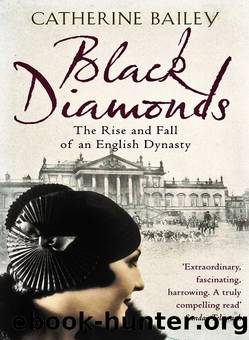Black Diamonds by Catherine Bailey

Author:Catherine Bailey [Bailey, Catherine]
Language: eng
Format: epub
Tags: History, England/Great Britain, Nonfiction, Royalty, Politics & Government, 18th Century, 19th Century, 20th Century
ISBN: 9780141906003
Publisher: Penguin Books Ltd
Published: 2007-11-01T04:00:00+00:00
25
A breeze blew through the marquees at Wentworth. It came from the south, smelling of industry: of tar, sulphur and the metallic tang of steel. A mile away, at Parkgate, the steelworkers and factory hands had returned to work. Dense clouds of smoke belched from the foundries into the late spring air, the roar of industry competing with the clear chimes from the church clocks in the villages nearby.
It was a Saturday morning, the fourth week of the coal strike, and 1,200 children, the sons and daughters of the New Stubbin colliers, stood outside the marquees waiting to be fed. A remnant from the Great War, the Fitzwilliamsâ agent had bought the former hospital tents as a job lot. A decade earlier they had stood in a line of others along the cliffs above Calais â Casualty Clearing Stations for British soldiers wounded at the Front. Now, under Billyâs instructions, they had been put up along the southern edge of Wentworth Park, close to Greasbrough and Rawmarsh, where many of the miners from New Stubbin lived. For as long as the coal strike lasted, Billy had undertaken to provide his minersâ children with one midday meal a week. Five miles away, at Elsecar colliery, a further 1,300 children were being fed.
The officials at New Stubbin pit had marshalled the children into a queue. Boys and girls up to the age of thirteen, they clutched the mugs and basins they had brought from home. As they waited in line, each child was given an orange. It was strange fruit to most of them; few, if any, had tasted one before. A few years earlier, a teacher at Rawmarsh Junior School had asked a group of ten-year-olds to write about their parents. The results of the classroom exercise reveal that, even before the coal strike began, family life in the Fitzwilliamsâ pit villages revolved around the struggle to survive. Food and work dominated their barely literate accounts. The descriptions were short, in some cases little more than a sentence, but they were the first thoughts that came into the childrenâs minds:
âI hawe gotta father and some fathers has dide [died] and the ladys get some roses and daffodils and croces and tulip and put on the graffes.â
âMy father gos to work. Wehen he comes home his has black has sut. he coms home at afternoon. When he comes home he has is dinner. he goes to wrk at nighte. When he comes home he bringht some moony back. My father goes to work to get some mony to get some food whit it.â
âMy father gos to wak [work] for mony to keep ues we bay food for to aet our Nell she waks at keethli [Keighley]. We had not inuf to keep us all So. She went a waye so we cud live aply [happily].
âI have got a mother at home and she warks hared and when she woshes some time is mase her pooly and then she mite die and my father will go in the cab and then myt bey some flower eles my anty will bey some.
Download
This site does not store any files on its server. We only index and link to content provided by other sites. Please contact the content providers to delete copyright contents if any and email us, we'll remove relevant links or contents immediately.
Melania and Me by Stephanie Winston Wolkoff(1060)
Orlando by Virginia Woolf; Mark Hussey(1048)
The Class of 83 by Hussain Zaidi(1004)
Live in Love by Lauren Akins & Mark Dagostino(981)
Dancing in the Mosque by Homeira Qaderi(972)
A History of My Brief Body by Billy-Ray Belcourt(910)
Virginia Woolf by Between The Acts(796)
Just as I Am by Cicely Tyson(767)
The Common Reader, Book 1 by Virginia Woolf(763)
Stranger Care by Sarah Sentilles(757)
Robespierre: A Revolutionary Life by Peter McPhee(754)
The Schoolgirl Strangler by Katherine Kovacic(745)
1914 by Luciano Canfora(738)
Unforgetting by Roberto Lovato(730)
Ariel (english and spanish Text) by Sylvia Plath(729)
Paris Without Her: A Memoir by Gregory Curtis(719)
Broken Horses by Brandi Carlile(718)
Harriet Tubman: The Biography by University Press(717)
Berlin Diary: The Journal of a Foreign Correspondent 1934-41 by William L. Shirer & Gordon A. Craig(714)
